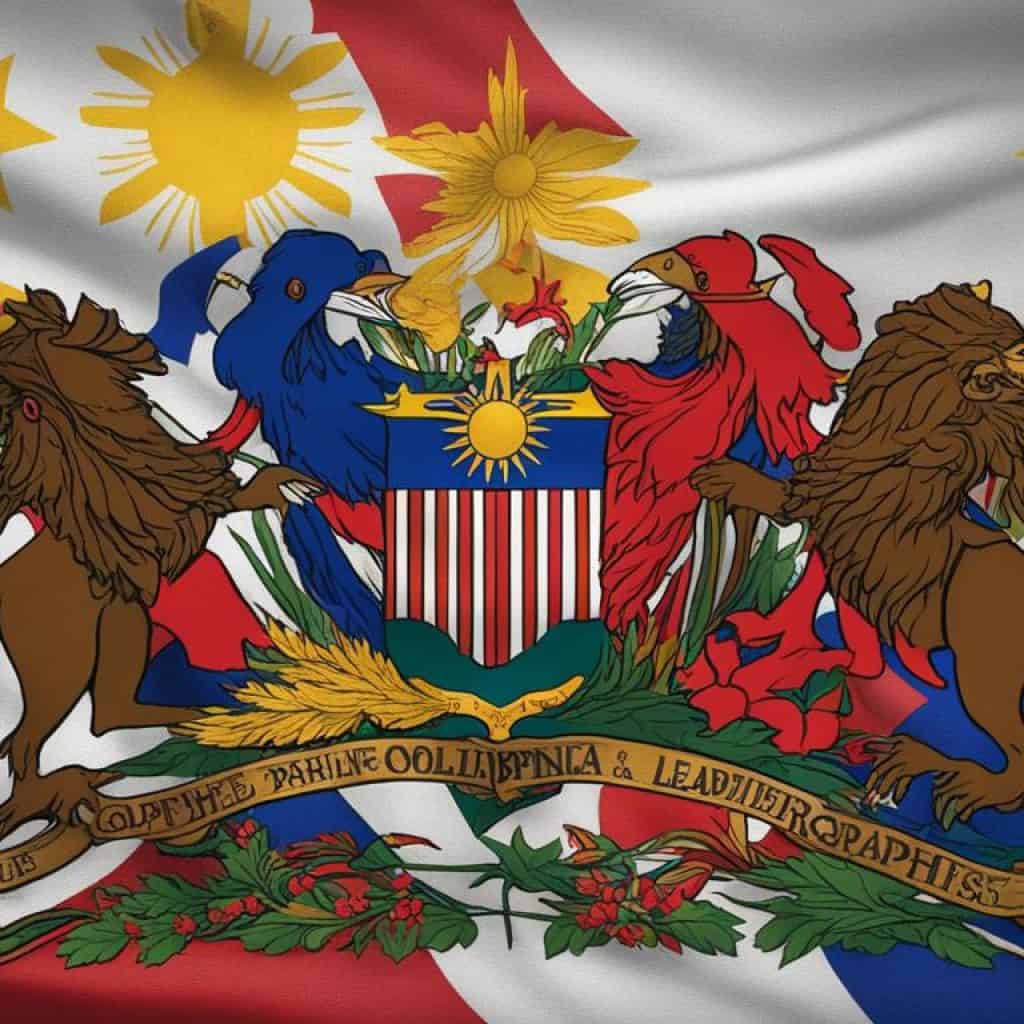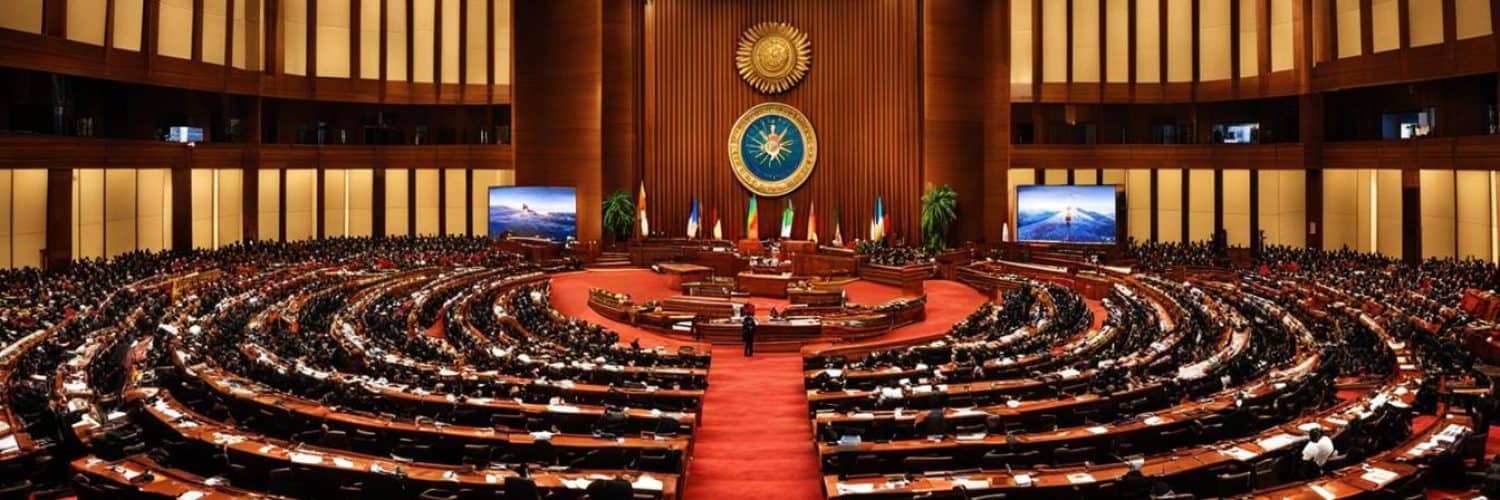Have you ever wondered how the House of Representatives of the Philippines influences the nation’s future? How do they enact laws and represent the Filipino people? Let’s explore the inner workings of the Philippine House of Representatives, also known as the Lower House of the Filipino Congress.
The House of Representatives is a key component of the Philippines’ legislative branch and serves as the country’s primary lawmaking body. Through a system of elected congressional representatives, it plays a vital role in shaping the nation’s future through legislative action.
Key Takeaways:
- The House of Representatives is the lower house of the Philippine Congress and is responsible for enacting laws and representing the Filipino people.
- Congressional representatives are elected through the party-list system and single-member districts.
- The House of Representatives plays a pivotal role in shaping the nation’s future through legislative action.
- Understanding the structure and powers of the House of Representatives is key to comprehending the Philippine legislative process.
- The public’s satisfaction and trust in the House reflect the ongoing efforts to ensure accountable and effective governance in the Philippines.
The Party-list System in the Philippines
The party-list system in the Philippines aims to provide representation to marginalized and underrepresented sectors in the House of Representatives. It was established to give a voice to small political parties and advocate for the interests of underrepresented groups in the country.
However, over the years, the system has faced several challenges and criticisms. Dominant parties and influential individuals have overshadowed the participation of small political parties and underrepresented sectors. This has led to concerns about the actual representation of marginalized groups and the dilution of their voices in the legislative process.
A significant development in the party-list system occurred in 2013 with a Supreme Court decision. The decision allowed individuals who do not belong to the sector they claim to represent to run as party-list nominees. This decision further complicated the system and raised doubts about the authenticity of representation.
“The party-list system was intended to empower underrepresented sectors and promote inclusivity in the legislative process. However, the 2013 Supreme Court decision opened the door for questionable groups and individuals to participate in the party-list election, undermining the system’s original purpose,” said a representative from the election watchdog group Kontra Daya.
Election watchdog groups like Kontra Daya have been actively monitoring the party-list system and identifying organizations with questionable affiliations. They have highlighted concerns about political clans, big businesses, and incumbent officials exploiting the system for their own interests.
Moreover, the party-list system has also been marred by allegations of corruption. Some party-list representatives have been accused of misusing their positions for personal gain. These incidents have further eroded public trust in the system and reinforced the perception of it being manipulated by the powerful and affluent.
The closure of ABS-CBN, one of the country’s largest media networks, also raised questions about the party-list system. Critics argue that progressive legislators who have been vocal in advocating for media freedom and accountability were not given significant representation in the House of Representatives, limiting their ability to influence key decisions.
Amidst these challenges, there have been calls to either abolish or amend the party-list system. Advocates for abolition argue that it no longer serves its purpose and has become a means for the rich and powerful to gain political influence. On the other hand, proponents of amendment aim to restore the system’s original objective and ensure that it truly represents the marginalized and underrepresented sectors.
Efforts to reform the party-list law are critical to addressing the identified shortcomings and restoring public confidence in the system. The aim is to create a more inclusive and genuine representation for underrepresented sectors and reaffirm the democratic principles on which the party-list system was founded.
Party-list Election Key Factors:
| Key Factors | Description |
|---|---|
| Commission on Elections | The Commission on Elections (COMELEC) is the government agency responsible for overseeing and administering elections, including the party-list election. |
| Underrepresented sectors | The party-list system aims to provide representation to sectors that are not adequately represented in the House of Representatives, such as labor, women, indigenous peoples, and farmers. |
| Dominant parties | Big political parties with significant resources and influence often overshadow smaller parties and limit the chances of underrepresented sectors to participate effectively in the election. |
| Questionable groups | Certain party-list groups have raised concerns due to their affiliations with political clans, big businesses, and incumbent officials, suggesting that they may not truly represent the marginalized sectors they claim to represent. |
| Corruption | There have been instances of alleged corruption involving party-list representatives, calling into question the integrity of the system and the motives of some participants. |
| Amendment of party-list law | Proposals to amend the party-list law seek to address the loopholes and challenges that have emerged, with the ultimate goal of ensuring genuine representation of underrepresented sectors in the House of Representatives. |
Structure and Powers of the House of Representatives
The House of Representatives is one of the three branches of the Philippine government, along with the executive and judicial branches. It plays a crucial role in the legislative process and governance of the country.
The executive branch is headed by the president, who holds the highest executive authority and is elected separately. The president, as the commander in chief, leads the executive branch, which includes the cabinet.
The House of Representatives holds the legislative power and is responsible for enacting laws. It consists of congressional representatives who are elected through the election process. All bills require the consent of both the House of Representatives and the Senate before they can be submitted to the president for approval.
The House of Representatives has the power to override a presidential veto with a two-thirds supermajority vote, ensuring that legislation can move forward even if initially rejected by the president.
Furthermore, the House of Representatives has the authority to impeach officials, while the Senate plays the role of trying impeached officials. This system of checks and balances ensures accountability within the government.
“The legislative powers granted to the House of Representatives reflect the democratic nature of the Philippine government, allowing for the representation of diverse voices and perspectives in the lawmaking process.”
Members of the House of Representatives also have access to legislative offices, which serve as their workspaces for carrying out their duties and responsibilities. Additionally, the House of Representatives allocates budget funds, including the contentious pork barrel funds.
Overall, the House of Representatives is a vital institution in shaping the future of the Philippines through the enactment of laws and the exercise of legislative powers.
Government Branches of the Philippines
The government of the Philippines operates through three distinct branches: the executive branch, the legislative branch, and the judicial branch. These branches work collectively to ensure the effective governance and functioning of the country.
Executive Branch
The executive branch is headed by the president of the Philippines. The president holds the highest executive authority and is responsible for leading the country’s governance and administration. The president delegates much of their power to the cabinet, which consists of appointed officials who oversee specific areas of government.
Legislative Branch
The legislative branch of the Philippines is composed of two chambers: the Senate and the House of Representatives. Both chambers have the authority to enact laws, ensuring that the interests and needs of the Filipino people are represented. Members of the Senate are elected through a plurality vote in multi-member constituencies. On the other hand, the House of Representatives has members elected through a plurality vote in single-member constituencies and through a closed-list proportional representation system.
Judicial Branch
The judicial branch in the Philippines plays a vital role in settling legal controversies and safeguarding the rule of law. It is responsible for interpreting and applying the law, ensuring that justice is served. The judiciary consists of various courts, including the Supreme Court, which is the highest judicial body in the country.
The division of powers among these three branches is a key characteristic of the Philippine government, providing checks and balances to prevent the concentration of authority. This system ensures that decisions and actions are transparent, accountable, and aligned with the interests of the Filipino people.

With distinct roles and responsibilities, the executive, legislative, and judicial branches of the Philippine government work together to promote good governance, foster development, and uphold the principles of democracy.
Public Satisfaction with the House of Representatives in the Philippines
According to a recent survey conducted by the OCTA Research group, a majority of Filipinos expressed satisfaction with the performance of the House of Representatives. The survey found that 54 percent of the respondents were satisfied with the House’s performance, while nine percent expressed dissatisfaction.
The survey also measured the public’s trust in the House, with 55 percent indicating trust and seven percent indicating distrust.
These results suggest a level of satisfaction and trust in the House of Representatives among the Filipino population.
Public Satisfaction with Government Agencies in the Philippines
The OCTA Research group’s survey also measured public satisfaction with various government agencies in the Philippines. The Commission on Higher Education (CHED) emerged as the top-performing and most trusted agency, with 80 percent of the respondents expressing satisfaction and trust.
Other highly-rated agencies include the Department of Education (DepEd), the Philippine National Police (PNP), the Department of Health (DOH), and the Department of Social Welfare and Development (DSWD), which all received high levels of satisfaction and trust from the respondents.
These government agencies play vital roles in the development and well-being of the Filipino people. The Commission on Higher Education (CHED) ensures quality higher education in the country, fostering academic excellence and providing opportunities for students to achieve their full potential. The Department of Education (DepEd) oversees the country’s basic education system, striving for inclusive and quality education for all Filipino learners. The Philippine National Police (PNP) is responsible for maintaining peace and order, safeguarding the safety of the public, and upholding the rule of law. The Department of Health (DOH) works tirelessly to promote and protect the health of the Filipino people, implementing healthcare policies, programs, and services. Lastly, the Department of Social Welfare and Development (DSWD) serves as the primary agency for social protection and poverty reduction, empowering marginalized sectors, and ensuring the welfare of the most vulnerable members of society.
The high levels of satisfaction and trust in these government agencies reflect the dedication and commitment of their personnel in delivering efficient and effective services to the Filipino people. It also highlights the importance of these agencies in improving the lives of citizens and contributing to the overall development of the Philippines.
Other Government Agencies and Public Satisfaction
The OCTA Research group’s survey also covered public satisfaction with other government agencies in the Philippines. Following the highly-rated agencies mentioned earlier, several other departments received positive ratings. These include the:
- Department of the Interior and Local Government (DILG)
- Department of Public Works and Highways (DPWH)
- Department of Labor and Employment (DOLE)
- Department of Tourism (DOT)
- Department of Science and Technology (DOST)
- Department of Justice (DOJ)
- Department of Foreign Affairs (DFA)
- Department of Environment and Natural Resources (DENR)
- Department of National Defense (DND)
- Department of Agriculture (DA)
- Department of Transportation (DOTr)
These agencies received varying levels of satisfaction among the respondents, indicating that the Filipino public acknowledges their importance and appreciates their efforts in their respective domains.

Example Quote:
“The Department of Tourism has been instrumental in promoting the beauty and cultural heritage of the Philippines. Their efforts have contributed to the growth of the tourism industry, which plays a significant role in the country’s economy. I’m satisfied with their work and the positive impact it has on our nation.”
-Anonymous Survey Respondent-
Survey Methodology and Sample Size
The survey conducted by the OCTA Research group aimed to gather insights into public satisfaction with the performance of the House of Representatives and other government agencies in the Philippines. The survey methodology involved collecting data from 1,200 adult respondents. The survey was conducted from July 22 to 26, ensuring a representative sample size for analysis.
In order to minimize potential biases, the OCTA Research group employed a random sampling technique to select adult respondents from various regions and demographics across the country. This approach ensured that a diverse range of perspectives were captured in the survey results.
The margin of error for this survey was +/- three percent. This means that the survey results have a range of accuracy within three percentage points of the reported figures. The margin of error helps to account for statistical variability and provides a measure of confidence in the survey findings.
The respondents were asked a series of questions related to their satisfaction with the House of Representatives and other government agencies. These questions aimed to gauge the public’s level of trust or distrust in these institutions and their perception of their performance. The survey results provide valuable insights into the public sentiment towards the House of Representatives and other government agencies in the Philippines.
| Survey Methodology | Sample Size | Margin of Error |
|---|---|---|
| Random Sampling | 1,200 adult respondents | +/- three percent |
Constitution and Government Type of the Philippines
In 1987, the Republic of the Philippines adopted a constitution that serves as the fundamental law of the land. This constitution outlines the structure of the government and covers various important aspects, including citizenship, suffrage, local government, social justice, human rights, and family matters. It is a comprehensive document that provides a framework for the governance of the nation.
The government of the Philippines operates under a republic system, where power is vested in the people and exercised through their elected representatives. This government type ensures that the Filipino citizens have a voice in decision-making and the opportunity to shape their nation’s future.
Economic freedom is an essential aspect of the Philippine government’s philosophy. The country’s economic freedom is evaluated based on ten freedoms, with a higher score indicating a greater degree of autonomy from government intervention. This commitment to economic freedom encourages entrepreneurship, innovation, and growth in various sectors, facilitating economic development and prosperity for the Filipino people.
Like any sovereign nation, the Philippines faces political and economic uncertainties that can impact corporate payment behavior. To assess these risks, the country has a country risk rating that considers various factors and helps businesses and investors make informed decisions.
| Constitution Adoption | Government Type | Economic Freedom | Country Risk Rating |
|---|---|---|---|
| 1987 | Republic | Score based on 10 freedoms | Risk assessment for businesses and investors |
International Participation and Agreements of the Philippines
The Philippines actively participates in various international organizations, reaffirming its commitment to diplomatic engagement and global cooperation. Through its involvement in these organizations, the Philippines contributes to regional and global discussions on crucial issues.
Furthermore, the Philippines has signed several environmental agreements, underscoring its dedication to environmental conservation and sustainable development. These agreements serve as a testament to the country’s commitment to preserving its natural resources for future generations.
| International Organization Participation |
|---|
| United Nations (UN) |
| Association of Southeast Asian Nations (ASEAN) |
| World Trade Organization (WTO) |
| Asian Development Bank (ADB) |
The tax authority in the Philippines is the Department of Finance’s Bureau of Internal Revenue (BIR). It is responsible for implementing and enforcing tax laws and regulations in the country. One of the taxes imposed in the Philippines is the Value Added Tax (VAT), which is levied on the sale of goods and services.
Image:

Chief of State and Head of Government in the Philippines
The chief of state and head of government in the Philippines is President Ferdinand “BongBong” Marcos Jr. He holds the highest executive authority and is responsible for leading the country’s governance and administration. As the leader of the executive branch, the president plays a crucial role in formulating and implementing policies and programs for the nation’s development.
Public Perception of the Senate in the Philippines
According to the survey conducted by the OCTA Research group, a majority of Filipinos expressed satisfaction with the performance of the Senate. The survey found that 53 percent of the respondents were satisfied with the Senate’s performance, while seven percent expressed dissatisfaction. Similar to the House of Representatives, the survey also measured the public’s trust in the Senate, which was reported to be at 55 percent.
Overview of the Philippine Government
The government of the Philippines, officially known as the Republic of the Philippines, operates under a system where power is divided among three branches: the executive, legislative, and judicial branches.
The executive branch is headed by the President, who holds the highest authority in the government. The legislative branch consists of the Senate and the House of Representatives, while the judicial branch is responsible for interpreting and applying the law.
One of the important aspects to consider in evaluating the Philippine government is its level of economic freedom. Economic freedom measures the degree of autonomy from government intervention and plays a significant role in promoting economic growth and development.
“Economic freedom is the key to prosperity.” – President Rodrigo Duterte
Additionally, the Philippines has a country risk rating that assesses the potential impact of political and economic uncertainties on corporate payment behavior. This rating provides insights into the stability and reliability of the country’s financial environment.
| Government Name | Government Branches | Economic Freedom | Country Risk Rating |
|---|---|---|---|
| Republic of the Philippines |
|
Measure of autonomy from government intervention | Assesses potential impact of uncertainties on corporate payment behavior |
Conclusion
The House of Representatives of the Philippines is an integral part of the country’s legislative process and governance. As the lower house of the Philippine Congress, it holds the power to enact laws and represents the Filipino people. Despite facing criticism and challenges, such as the party-list system and allegations of corruption, the House of Representatives remains a key institution in shaping the future of the Philippines through legislative action.
The public’s satisfaction and trust in the House of Representatives, along with other government agencies, reflect the ongoing efforts to ensure accountable and effective governance in the country. Continuous improvements and reforms are being made to overcome the identified issues and strengthen the role of the House as a representative body of the Filipino citizens.
As a vital component of the Philippines’ legislative branch, the House of Representatives, also known as the Philippine House of Representatives, Filipino Congress, or Lower House Philippines, operates as the voice of the people in the country’s government structure. With congressional representatives diligently fulfilling their roles, the House of Representatives embodies the democratic principles of the Philippine Parliament and serves as the primary lawmaking body in the nation.


















Add comment